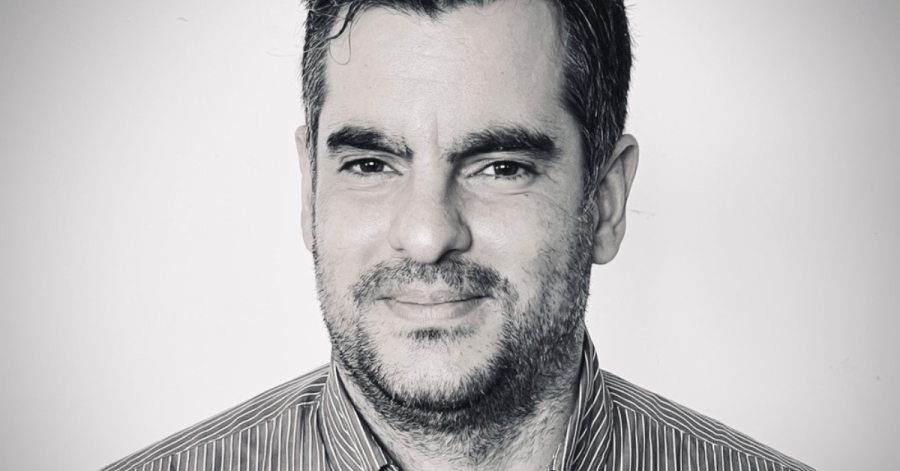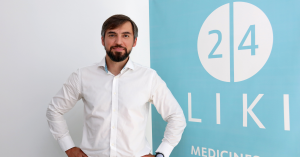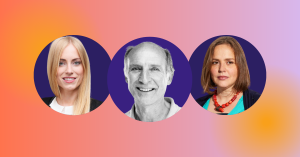Gregory Agriopoulos is the CEO of Magos. He has MSc in Electrical Engineering from the University of Patras and a mini MBA in Technology Innovation from AIT. The CEO of Magos has over ten years of experience in project and team management. Magos is a deep tech startup based in Athens, Greece, and also operating in London. As the CEO puts it, the goal of Magos is to “provide a solution that will enable the users to interact like they interact in the physical world.” Their product, the Magos gloves are HCI-based and aim to take the haptic technology to the next level and provide the so-called Ultra Haptics. That will completely immerse users into the VR experience. The Magos Gloves will make digital objects touchable. The Recursive reached out to Agriopoulos to learn more about Magos’ solution and how it can benefit the medical field and aerospace simulation training.
The Recursive: Could you please tell us a bit about yourself?
Gregory Agriopoulos: I’m the CEO and founder of Magos. We are a deep-tech startup located in Athens, Greece, and operating in London, the UK. We’re active in the human-computer interaction area or human-robot interaction. And the goal is to provide a solution that will enable the users to interact like they interact in the physical world, using their hands and fingers.
What inspired you to come up with the idea for the Magos gloves?
It was my interest to start building technological products from my early studies. I have a technical background in electrical engineering. And right after [the studies] I followed a career in business development and contract management for technology products. I followed an MBA in technology innovation. During my MBA, I noticed the European Space Agency hackathon back in 2016. We participated (it was me and another colleague back then) with the Magos idea. The idea back then was to take advantage of the space related technology, it was based on magnetism, and to build a solution that will translate sign language into speech. This was the first idea. We won the national competition and then went to an international competition in Toulouse, France. We were ranked really high then – third place. So we decided to continue and see if this idea could be a product. And here we are today.
You mentioned that it started initially as a tool that will convert sign language to speech, so would Magos still have that ability?
The short answer is yes. We have tested several market applications in medical, healthcare, and other areas like robotics. Specifically, about the sign language, the huge problem is that when you need to translate the sign language, you also need to see the facial expressions aside from the hands. This was a big constraint. So even though we have hand tracking, there is a missing part about facial expressions. The way we can penetrate this market is to create a new language that will be based on hand tracking alone or partially translate the existing sign language. So, this is not the first priority today.
How do you monetize the services Magos offer?
Since we are developing a deep technology product, it’s very complex. It’s hardware plus software, and then the application. We managed to acquire EU funds from Horizon 2020-2021. So this was the basic revenue stream or actual funds in the previous years. But right now, we have some early customers in the medical sector, like doctors and surgeons training, so some clinics. And the second revenue stream comes from big companies in the general industry 4.0 space that already want to test these types of solutions – high accuracy, and finger motions, how to interact in virtual space.
Can you tell us a bit about the fundraising process during the creation of the Magos gloves? Did you have to bootstrap the startup?
Correct. In the early stages, we didn’t get any venture capital funding, and it was equity-free funding from European projects. In the initial stages, we did bootstrap the company. So we invested our money as founders. And following that, we tried to attract some venture capital. But this region of Europe is not so friendly to hardware products. So we didn’t manage to get any funds to provide some gas for our needs. So the only way was to secure some funds from European projects, equity-free funding. Today we have a commitment from a VC.
Who are your target customers besides people in the medical field?
We built a hand tracking technological product that can track the hand motions and the finger motions of your hand. This could be applied in many markets and has many applications. So we have to analyze where we should highlight and focus first. We saw that the virtual training and simulation area is very much ruled worldwide. Big companies spent money on applications in this space. Specifically, we see that Magos can contribute a lot to virtual training and simulation in aerospace, like pilot training. And in health care with surgical training and doctors training.
What is the business model of Magos, and how did you come up with it?
The business model depends on the end market or the application. For example, since we have a hardware product, it is very easy to see that we have one-off hardware sales. But also we have a software part of the product because it is required in order to operate well. We have a license for the software we develop. So it’s a point of sale for the hardware and the license for the software.
How do you define a successful product and a successful business model?
First of all, you need to understand what the market needs and how the market operates. Because when we have a target group, a customer group, we need to see how these types of customers work. So, for example, in aerospace, the companies outsource the software development, and the company develops the software and introduces some hardware components that the end-user needs to buy. This is very important. So we needed to understand this type of operation to see where we stand in the life cycle. For example, this is different from the healthcare sector. In the healthcare sector, users rely a lot on the hardware provider. The software is important too, but the hardware plays a more important role. So in the healthcare sector, we can attract the contracts directly, while in aerospace, we need to partner with software providers.
Are you planning to raise an investment round in 2022, and if yes, can you tell us more about it?
Right now, we have an agreement with an investor. So the answer is yes. It’s not final yet. But we have a written agreement, and this funding round is close to 1 million euros. And it will be from one or two investors.
Do you think the Magos hand tracking solution can completely change the medical field?
I think the whole immersive technology ecosystem is coming to revolutionize the current procedures. The training sector is very critical. So, today with the COVID situation, the training is rare, impossible to happen, and serious issues arise from no training. With the Magos gloves and the immersive technologies area, the doctors and medical personnel could be trained with very high capabilities of interacting with the virtual space. So you can understand that with Magos’ involvement, you can 100% replace the traditional training methods. This is very important.
How will digitizing something like making an art sculpture (with the use of the Magos gloves) improve the world?
This was one of our early target markets – 3D design and sculpting. So actually, this is not a low-priority market. We see that Magos is an input device, like the mouse of your PC. And our vision is to set up Magos as the main input device of the computer of the future. That will be the Head Mounted Displays (HMDs) in VR/AR. This is the main role of Magos and our vision. So speaking about sculpting and 3D sculpting, we think that with a solution that can track the fingers with fairly high accuracy, you can transform the sculpting or the 3D design sector, which will be a huge breakthrough. Today, you have 3D printing capabilities even in your home place.
Do you have any advice for new tech startups on building a successful business model?
The first piece of advice is that you need to be patient. You need to focus on what you want to do, understand what is reasonable, and make the best decisions. And you need to be optimistic. This is the main characteristic you need to have. The Magos product is really tough, and we’ve had a lot of tough times. We should not hide from that. About the business model, I think you need to have the know-how inside your company. [To know] if you need to have a business partner, how to analyze the market. You need to understand how the market operates today, how you can penetrate this lifecycle, and build the proper collaborations or strategies first to build the proper collaborations and have the [market] penetration.
You mentioned that there was some tough time and some obstacles while you were working on starting the project. Could you tell us a bit more about that?
First of all, the team. In the first stages, the guys that were involved, today they’re not here. So, the team was not aligned – some people needed to have a full-time job, others [already] had a full-time job and needed to work part-time. So, depending on the project’s maturity, the team is the number one part. And even if you face some critical issues with the team, you need to have a contingency plan on how to overcome them. Second, and very important, you need to have the funds required, or else you cannot hire personnel. You need to undertake many responsibilities and technical or non-technical work. And this is a very important aspect for any person that would like to start a similar initiative or any other startup – the funding. And next is how to hire personnel – you need to understand at what stage you are, what type of persons you can hire, very experienced, low experienced, medium. And you need to understand if this specific person could help you and the whole team progress and power your goals.
What are your 2022 goals for Magos?
As I mentioned, we are opening an office in the UK and looking forward to attracting some customers in North America. So this is very important for us. And, of course, to enlarge our team and secure the current funding round.
Is there anything else you’d like to add?
I would like to add that it is a high-risk effort in the beginning [when] you’re initiating your startup and your idea. However, it worked really well for me, and I would try this endeavor a hundred times again (laughs) if this happens. I would suggest that you should try that. It is a hard test for yourself but has a high impact, and you gain a lot.







